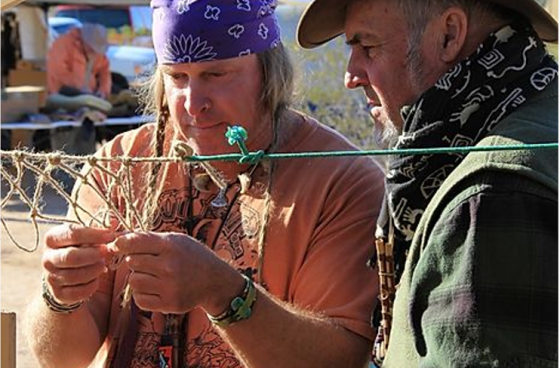Honoring our shared heritage
"I am a human being, nothing human can be alien to me." Terance (154 BC)
The future is not to be found in the past. Yet, we know that the outermost bud on the uppermost branch is fed by the deepest root. Ninety-five-plus percent of our history as humans cannot be ignored. "Written" by scavengers, hunters, gatherers and early agriculturalists; the story of the Stone Age is our story. It is the great common denominator of humanness. Primitive Technology is a way into that story.
We are drawn to it as to a fire ... and, there we find others.
The learning and practice of primitive skills can help us all get in touch with our own roots – no matter what our particular heritage may be…if we go back far enough into our own pasts, we discover that we are all aboriginal peoples at some time in some place. 'Primitive' ('first') skills are our shared inheritance.
No one is from no where. The blood of our ancestors flows in our own veins. Our Aboriginal legacy is written in the very make-up of our own bodies. The ancient caves and campfires of our pasts call to us from within. Primitive Technology is our inheritance as well. It is a world heritage that knows no race, creed or color. It is foreign to no one. It is the shared thread that links us to our prehistory and binds us together as human beings.
That we honor here above all.
Steven M. Watts
Primitive Technology - "The original digital technology". Watts, 2000
Experimental Archeology may be defined as ''that branch of archeology which seeks to interpret material culture, technology, or lifeways of the past by means of structured, scientific experimentation".
Experiential Archeology, closely akin to experimental archeology, involves "interpretation of material culture and technology by means of physical reconstruction, or experiential means".
Primitive Technologies are based on artifacts or generalized models that may be part of or derived from prehistory. The use of appropriate materials and procedures may be aided by the use modern tools during the learning stages. Higher levels stress the accuracy of researched material, tools, and procedures. "The objective is to produce plausible replications/reconstructions/reenactments to gain insights and make inferences to the many fields of social and applied sciences including: archaeology, anthropology, sociology, living history, recreation and others.
Primitive Technology Newsletter No. 1, 1995
Rabbitstick is a totally unique learning and living experience made available to you from Backtracks. This premier event, focuses on experimental and experiential archaeology, primitive technology, and wilderness living skills. It has been held annually - the 3rd week of September - since 1988 near Rexburg, Idaho on a privately held preserve on the banks of the historic Henry's Fork of the Snake River. Over 400 acres surround us with land that is held in trust to remain as a natural habitat for birds, waterfowl and wildlife.
Rabbitstick is the oldest of the contemporary primitive skills gatherings - often copied, but never duplicated. It's a perfect excuse for you to get away and sample a community based on the lessons of the old ways.
Backtracks brings you these innovative gatherings, with dozens of workshops that will be familiar and we also introduce you to many new and varied formats, skills and personalities. Each night is filled with homemade music, dance and entertainment. Mid-week features our annual dress-up night with masks and buckskin finery.
Teachers and artisans in primitive technology are invited by Backtracks to attend Rabbitstick in order to share ideas and methods as well as spread the arts through hands-on workshops to people such as yourself. You can expect skills instruction from some of the nation's top primitive technologists and artisans.
30+ classes are held from 9am to 5pm daily. Lecture/ Discussion Sessions are information oriented and cover a broad subject. Demonstrations are a how to presentation with some practical instruction. Hands-On classes will provide you with instruction to actually complete a project or practice a new skill. Displays illustrate the breadth to which a subject may be taken. Symposiums are intensive sessions led by multiple instructors that focus on one topic, they may go for one hour to all day.
Some workshops may have a materials fee that will be collected by the instructor. Limits to class size are controlled by the instructors and sign up sheets will be made available during the Opening Day Blanket Fair 11am-1pm opening day. Dates, times, limits, costs etc. of the classes will be posted on the camp Bulletin Board and announced at morning meetings by instructors.
Classes may include Braintanning, Primitive Pottery, Felting, Useful Plants, Bows & Arrows, Flintknapping, Traps & Snares, Basketry, Altatls & Darts, Birch-bark Crafts, Drumming, Fire by Friction, Pecking & Grinding, Food Gathering, Netting, Knife Making, Primitive Games, Knife Sharpening, Finger Weaving, Tule / Cattail Crafts, Shelter Building, Shoe and Sandal making, Drop Spindle Spinning, Stone Axes, Willow Crafts, Earth Pigment Paints, Blow Guns, Holistic Medicine, Gourd Crafts, Backstrap Weaving, Cordage & Fibers and Many More.
We all have opposable thumbs and benefit from a world that arose from that "original digital technology". Register to attend Rabbitstick 2018 and learn more about this shared heritage. Visit our website and find out more about it - you'll be happy you did. All event information is available to you immediately. We'll be excited to have you as a part of our camp.
